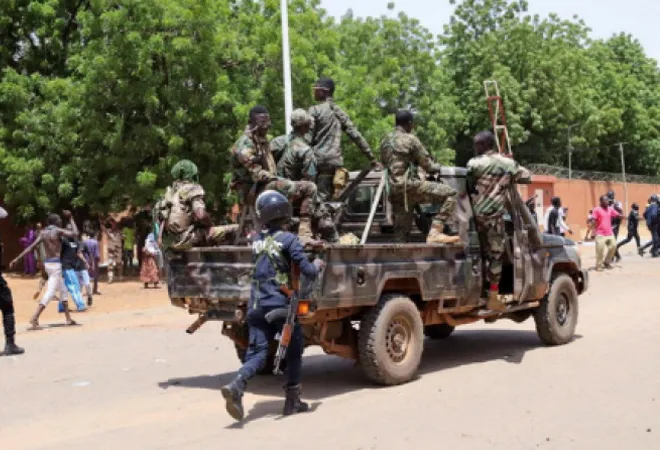-
CENTRES
Progammes & Centres
Location
Regional African blocs should try to find solutions through diplomacy before the coup in Niger causes regional instability and leads to a full-fledged war

A lot can happen over 30 months. In February 2021, when President Mohamed Bazoum was elected the 10th President of the West African nation Niger, it was a moment of celebration for the nation. This was Niger’s first peaceful, democratic transition since it gained independence from France in 1960. In the last two odd years, Bazoum was making steady progress against the Islamist militants; he seemed to be on good terms with the armed forces; and, most importantly, he had the support of both the United States (US) and France.
This was Niger’s first peaceful, democratic transition since it gained independence from France in 1960.
Yet, in an unsettling reversal of events, Niger was thrown into chaos when the regime of President Bazoum was ousted through a military coup. As a result, the political landscape got upended, leaving its citizens and the entire world stunned. The country’s borders were closed swiftly, adding to the uncertainty and chaos.
In the turbulent Sahel region of Africa, Niger has been relatively stable in recent years. It was stable until 26 July, when some members of Niger’s presidential guard surrounded the President’s palace in Niamey and detained the President in his house. Later, the mutineers representing different branches of the military declared on national television that they had toppled the government. And two days later, on 28 July, the Commander of Niger’s presidential guard, 59-year-old Gen. Abdourahmane Omar Tchiani, in a televised address, claimed leadership.
Although General Tchiani attributed the coup’s cause to bad social and economic management and the government’s failure to combat militants, the actual reason remains unclear. It seems that President Bazoum had plans to dismiss General Tchiani from his post of commander of the presidential guard. Was it preemptive revenge from the General? It could be. The coup could also be linked to a fight over controlling the rich uranium mines of Niger.
Niger is the world’s seventh-biggest producer of uranium, the radioactive metal widely used for nuclear energy, treating cancer, and is a key raw material for the nuclear industry. Niger is a major supplier of uranium—meeting 15 percent of France’s uranium needs and one-fifth of the European Union’s. Understandably, the coup is raising concerns about energy security in Europe.
As a matter of fact, the United Nations (UN) has planned to use Niger as a logistical base to withdraw its 13,000-personnel peacekeeping operation in Mali, and it was scheduled to be completed by the end of 2023.
Further, Niger is a crucial ally of the West in its fight against Islamist militancy. Currently, the US has 1,100 troops and two drone sites in Niger, one in Niamey and another in Agadez. The US invested around US$110 million in the construction of the drone base, in addition to spending US$30 million annually for its maintenance. France also has 1,500 military personnels in Niger. As a matter of fact, the United Nations (UN) has planned to use Niger as a logistical base to withdraw its 13,000-personnel peacekeeping operation in Mali, and it was scheduled to be completed by the end of 2023.
As the proverb goes, there are no coincidences in politics. The coup unfolded in Niger exactly when Russian President Vladimir Putin was busy hosting the African heads of state and ministers in Saint Petersburg. This prompted Mykhailo Podolyak, an adviser to the Ukrainian President, to publicly accuse Russia of orchestrating the coup. Although Russia’s official communication called for Niger to restore constitutional order as soon as possible, the timing of the coup and the waving of Russian flags in the streets in the days after the coup definitely raised suspicion.
The coup unfolded in Niger exactly when Russian President Vladimir Putin was busy hosting the African heads of state and ministers in Saint Petersburg.
Meanwhile, the Wagner group founder, Prigozhin, openly celebrated the coup and blamed the legacy of colonialism. For Wagner, the run of coups represents a business opportunity. His forces already operate openly in Mali and Sudan in the coup belt, as well as in the nearby Central African Republic and Libya. And now, Niger could become his most prized catch.
Days after the coup, thousands of protesters marched through the nation’s capital carrying Russian flags and denouncing France for looting their country’s wealth. The enraged protesting mob set some parts of the French embassy on fire. This illustrates a distinct pattern across the region. All of these former French colonies currently undergoing coups have one thing in common: The rejection of France and its neocolonialist policies. Mali was the first country to rebel against France, followed by Burkina Faso and now Niger. The general public already had a poor opinion of France. Military leaders may continue to resort to “scapegoating techniques”, invoking these anti-French sentiments to consolidate their raison-d’être.
The action of the military received sharp criticism from African Union (AU) and the West African regional bloc, ECOWAS. Further, ECOWAS urged the junta to release Bazoum immediately and issued a deadline for restoring democratic rule. Similarly, the US and France severed ties with Niger. In retaliation, the Niger junta revoked all five military deals with France dating between 1977 and 2020.
The enraged protesting mob set some parts of the French embassy on fire.
On the other hand, neighbouring Burkina Faso and Mali have taken unprecedented action where they declared that foreign military intervention in neighbouring Niger would be considered a declaration of war against them. Guinea, the other country of the region that has experienced a coup recently, released a separate statement in favour of the junta in Niger.
If Niger, Burkina Faso, and Mali (N-BF-M) clash with Nigeria and France, this brewing conflict might eventually engulf the whole Sahel Region and perhaps even spread to some countries of Northern Africa such as Libya, Algeria, and Egypt. Although France and Russia won’t engage in direct combat in case of a potential regional war, even the initial backing of opposing camps would result in significant destruction. As the countries scramble to pick a side, the threat of a regional war looms large.
The Sahel Region has suffered from bad administration, civil conflicts, and violent extremism for a very long time. This coup d'état in Niger, the eighth in three years, merely prolongs those agonies. If the military in Niger is successful in maintaining its grasp on power, it will represent a khaki regime across four West African nations in addition to Sudan in North Africa. It also illustrates how France and other foreign powers’ military-led engagement failed to stop the escalating Islamist insurgency in the region. As the complaints of bad governance, corruption, and suffering are pervasive in the continent, many more African countries of the region and beyond may eventually experience similar military takeovers.
In retaliation, the Niger junta revoked all five military deals with France dating between 1977 and 2020.
Going forward, although the hopes of a diplomatic resolution to the standoff is dim, the international community, including ECOWAS, must remain cautious before taking any hasty action and try to find solutions through diplomacy and negotiation. Otherwise, this political unrest in Niger would surely escalate into a full-fledged regional war in an already volatile region, making it easier for the Islamists to expand their terror networks.
Before the coup, Niger’s two most pressing issues were a flawed democracy that could not grant actual legitimacy to the elected and the unrelenting Jihadist violence. However, the coup may actually fix Niger’s two fundamental problems. It could ‘reboot’ its democracy, which had been stifled by the de facto single-party system, and it could also result in the creation of a more effective security policy.
Before the coup, Niger’s two most pressing issues were a flawed democracy that could not grant actual legitimacy to the elected and the unrelenting Jihadist violence.
During his house arrest, Niger’s now-removed President Bazoum made a clarion call when he wrote for the Washington Post, “Fighting for our shared values, including democratic pluralism and respect for the rule of law, is the only way to make sustainable progress against poverty and terrorism”. Everyone in Niger, whether they support the coup or not, will agree with him that Niger needs to set an example by quickly reverting to civilian rule and perhaps transforming its Constitution.
Granted, optimistic projections for the future of this vast country may appear almost Panglossian at the moment. However, in Niger, the process of restoring democracy through a coup has happened before. In fact, the current coup in Niger is the fifth since gaining independence from France in 1960. And on the past three occasions—in 1996 (contested), 1999, and 2010—Niger bounced back as a more robust democracy. Now history may repeat itself. The world will keep a close eye on Niger, hoping for a peaceful resolution to the conflict and the restoration of civilian administration. As Vaclav Havel once said, “Hope is not the conviction that something will turn out well, but the certainty that something makes sense, regardless of how it turns out.”
Samir Bhattacharya is Senior Research Associate at Vivekananda International Foundation
The views expressed above belong to the author(s). ORF research and analyses now available on Telegram! Click here to access our curated content — blogs, longforms and interviews.

Samir Bhattacharya is an Associate Fellow at ORF where he works on geopolitics with particular reference to Africa in the changing global order. He has a ...
Read More +